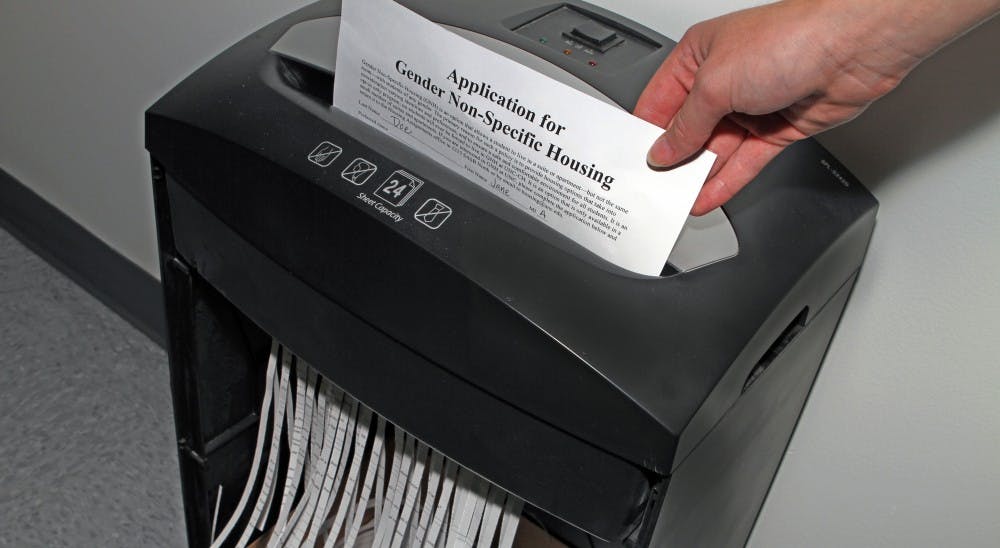But this isn’t the first time the program has come under fire statewide.
Before the board’s decision, an N.C. Senate bill in April sought to ban gender-neutral housing at UNC-system schools, and legislators discussed a provision in an N.C. Senate budget proposal to eliminate UNC-CH’s program.
The housing debate formed amid concerns that gay, lesbian, bisexual and transgender students are bullied in residence halls.
But board members say that taxpayer dollars can be spent to make all students feel safe on campus through other methods.
“The board believes there are more practical ways to achieve that goal than assigning young men and women to the same campus suite,” said Peter Hans, chairman of the board.
Hans said campuses could instead create outreach programs for LGBT students.
Leading up to the vote, board members also said that the program could distract from academic issues.
Tami Fitzgerald, executive director of the North Carolina Values Coalition, said in a letter to the board that a gender-neutral housing program could increase sexual assault incidents on campus. She said LGBT students rarely feel threatened in residence halls.
But according to Campus Pride, a national group that advocates for LGBT rights, 23 percent of lesbian, gay, bisexual and queer students, faculty and staff on college campuses have reported harassment, and 39 percent of transgender people reported harassment.
Shane Windmeyer, executive director of Campus Pride, said the Board of Governors did not seek input from the students and advocates involved.
But Joni Worthington, spokeswoman for the UNC General Administration, said position statements were shared with the board before the meeting, including a letter advocating gender-neutral housing from Campus Pride.
Anthony Dondero, a student at UNC-C who worked on the gender-neutral housing campaign, said the board was motivated by politics.
To get the day's news and headlines in your inbox each morning, sign up for our email newsletters.
“Students have been working on it for a long time, and to see it shot down not by our schools, but by the BOG on a statewide level, is a clear message that we’re not welcome in the UNC system as we are,” Dondero said.
Claybren said the board ignored the activism of students and administrators.
“There’s a disconnect between the Board of Governors and students and administrators at UNC,” he said. “Our Board of Governors went in with a political ideology and plan to strike it down.”
The board met with 16 new members — all appointed by the Republican-controlled N.C. General Assembly — for the first time on Aug. 8.
Al Humber, public relations and community outreach director for UNC-A’s Alliance, an LGBTQ group on that campus, said the decision was not surprising after recent legislation around social issues, such as the new law that puts stricter limitations on abortion clinics.
“I thought, well, that sucks — the pink cherry on top of the pudding cluster-mess, a disgusting amount of backwards treading for the state,” Humber said.
For Campus Pride, the board’s treatment of the issue foreshadows a stormier future for communication between members and students.
Windmeyer said the group will talk to leaders about what they see as the board’s inaccessibility this year.
“The Board of Governors did not want students to know, and the larger issue (is) that the BOG act on business when students are away,” Windmeyer said.
Windmeyer said he believes the board purposefully scheduled the vote on gender-neutral housing during the summer to avoid student input.
Now that the ban is in place, campus administrators are turning their attention toward helping LGBTQ students who may have felt alienated by the ban, said Arthur Jackson, vice chancellor for student affairs at UNC-C.
“The ban allows no recourse for people of different genders or sexual identities,” Jackson said. “We are going to be talking to our GLBTQ students and let them know that we support them.”
Both UNC-A and UNC-C will continue arranging special accommodations for students on a case-by-case basis.
The coming year will be punctuated by gender-neutral housing discussions, Jackson said. He plans to talk with faculty, students and board members to help all students feel safe while complying with the new regulations.
Windmeyer said he is hopeful that one day, when the state elects more Democratic politicians, the ban will be reversed.
But Fitzgerald said she is confident the ban is permanent.
“The BOG and the General Assembly appear committed to a policy that would prohibit young men and young women from living together in close proximity at taxpayer expense,” she said in an email.
But the ban is by no means the final page of the gender neutral housing discussion, Jackson said.
“It’s an issue that is still alive and very much on the radar,” he said.
“It’s an embryonic topic, and it’s just starting to be discussed.”
state@dailytarheel.com




